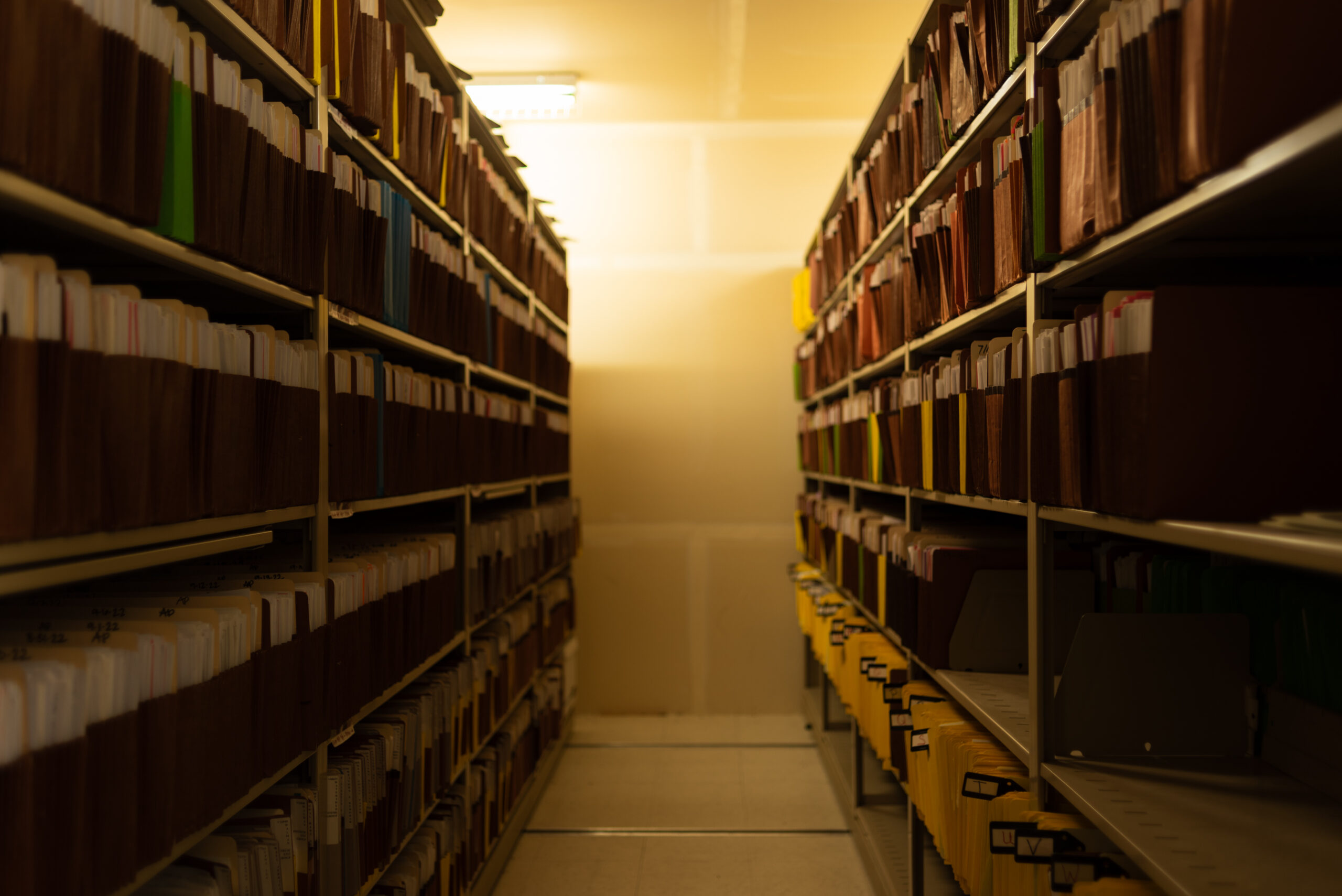
The Records Management Department (RMD) seeks to merge technology and efficiency for CSKT departments by offering expertise in records management fundamentals.
The RMD mission is to develop and manage an organization-wide records management system to achieve a higher level of self-governance in this important area of federal regulation. RMD supports the Tribes’ sovereign right to self-govern by regulating the creation, retention, use, and disposition of official records of tribal resources, information assets, and cultural assets.
Our goal is to establish an electronic records management system (ERMS) to enable efficiency with secure and controlled access, improve accuracy of information assets with version management, and provide a standard approach for records retention. By accomplishing these goals, RMD will support paper reduction cost savings and enable managers to transition into the digital records management environment of this present technological age. The RMD will assist in maintaining the records lifecycle within the organization; this includes the inventory, storing, accessing, scanning, and disposition of documents.
Department Head: Charmel Gillin
Phone: (406) 675-2700 ext. 1037
Email: charmel.gillin@cskt.org
Hours: Mon-Thurs 7:00am – 5:30pm

Values
High Quality Customer Service
The RMD has set a goal to establish collaborative and professional relationships with records management teams at local governments and organizations to improve communication and networking for the purpose of serving the public. This goal will begin with developing the ERMS and equipping the CSKT with the policy and procedure structure most capable of accomplishing CSKT objectives.
As public records are identified within CSKT and accessibility points are refined, we will strive to host links to other local government record keepers to add a higher quality of service for our constituents.



Eligibility:
The Records Management Department will support CSKT departments, employees, contracted personnel, and stakeholders who create, access, or store files regarding CSKT business transactions, cultural or historical assets, citizenship, and other records of special purposes unique to the Flathead Nation. Service requests are initiated by CSKT officials and approved through CSKT Records Management policy and procedures.
Credentials:
RMD is a new and developing area of support service to CSKT. It is being built with the range of expertise capable of transitioning from legacy systems which have supported CSKT for a “good” long time. RMD staff are supported to obtain national certification status and security levels necessary for the most sensitive and confidential data. We will pursue these credentials and remain qualified to support the needs of CSKT and its citizens with professional, technical, and legal expertise.
Frequently Asked Questions
What defines a record?
“Records” are all files documenting your primary objectives to accomplish the tribal government’s activities and decisions. (These could include voice messages, emails, sticky notes, and other more obvious records such as memos, letters, minutes, or reports).
How should I handle a record that seems important but isn’t relevant to the primary objectives of my program, today?
Certain files or documents may also bear a cultural or legal value and should be considered permanent or archival, depending on authenticity, perceived cultural quality, or if there’s a possibility for legal challenges to the topic.
IF YOU’RE UNSURE whether it has cultural or legal value, treat it as if it does and contact your records specialist or other management authority for a decision before sharing or disposing.
What is a “trust” record?
Some records are considered “trust” records because of the applicability to a resource managed by CSKT under federal government (93-638) contract, in trust, for the CSKT or an individual member of the CSKT, or other tribe. “Trust” records or resources are also under the authoritative oversight of the Bureau of Indian Affairs, Flathead Agency. There are certain security and storage requirements for trust records.
IF YOU’RE UNSURE whether it’s a trust record, treat it as a trust record and contact your records specialist or other management authority for instructions before storing.
What is a “scheduled” record?
When a record is “scheduled” it is given a useful life and disposal date. The federal scheduling guides are called GENERAL RECORD SCHEDULES or (GRS). The CSKT is working toward establishing a CSKT wide GRS, and until then the federal guides are in use.
What is an “unscheduled” record?
When a record is “unscheduled” it is considered permanent, until scheduled.
How can I start getting rid of older files?
Make a list (inventory) of all of the record sets you have in whatever program or category you want to start. The list should show:
- Name of record set (e.g. program meeting minutes),
- the Date Range or Values of the record set (e.g. FY or CY date ranges),
- The type of record (e.g. paper or digital),
- Where the record is kept (e.g. my desk drawer or program shared drive or both),
- and Who has or should have access (e.g. public information or program use only, or department head and program manager only).
Contact the CSKT Records Management Department for assistance, if needed.
Why do record managers refer to “NON Records”, and what is an example?
Non Records is a term used to identify record not otherwise considered of primary need to your mission. Non Records are TEMPORARY and kept for convenience or unofficial business. The following are some examples of a NON RECORD:
- Company Journals published and made available in large quantities to the general public or a specific audience. (e.g. CSKT Annual Report publication delivered to all departments and tribal members)
- Emails printed out and kept for easy reference which are duplicates of the electronic record filed in a subject file on a shared drive (e.g. NOTICE TO ALL EMPLOYEES to please remember to submit ADP approvals by these dates due to the upcoming holidays)
- Financial records kept in at the program/department level for easy reference (e.g. Purchase Orders submitted on Microix and printed to help track the order or notify a co-worker that the order was submitted)
These NON RECORDS may be useful for a time, but when they are no longer serving a purpose, should be disposed of in accordance with the consensus of all who are utilizing the copies.
IF YOU’RE UNSURE whether it’s a record, treat it as a record and contact your records specialist or other management authority for a decision before disposing.
